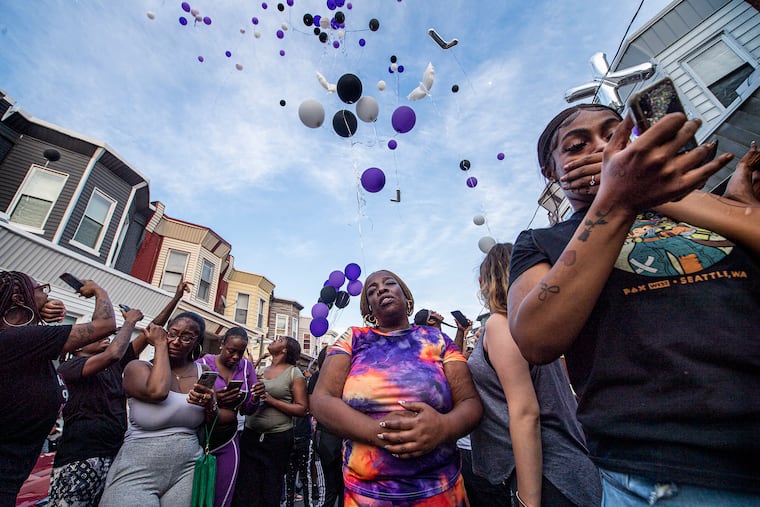In Philly, every day is National Day of Remembrance for Murder Victims
As we approached a day meant for us to remember, I reached out to an ever-growing list of mothers whose stories I’ve yet to fully tell.

They remember. On the day that their loved ones were born, and on the day that they died.
They remember. As they release balloons into the sky, and place fresh flowers on well-kept graves.
They remember. In their private thoughts, in public displays, and, of course, on Sunday’s National Day of Remembrance for Murder Victims, a day to pay tribute to those lost, and also those left behind who will never forget.
As the day neared, I heard from mothers whose heartbreak I’ve long chronicled — those who’ve received some justice for the deaths of their loved ones, and even more who are still waiting.
It’s been six years since Yullio Robbins’ 28-year-old son, James Walke III, was shot and killed on a Germantown street in broad daylight.
Her son’s case recently took a bitter turn: She received a text from the detective who had committed himself to trying to solve Walke’s murder. After more than 30 years on the job, it was time for him to retire and turn the case over to another investigator. She wept at the news.
It might be fine, Robbins said, but the relationship she forged over the years with Detective Gregory Santamala gave her a rare kind of hope. His departure from the case felt like yet another loss.
“It just means I have to work harder,” Robbins said when we spoke this week.
There have been 1,739 shootings and 392 homicides this year as of Sept. 21 — the overwhelming majority by gun.
In my own effort to make sure none of us forget, I regularly share many of the stories behind those numbers. But the truth is that I could share the story of a murder victim every day, in any given year, and still fail to scratch the surface of the collective toll that all of this pain has taken on our city.
And so, in the week leading up to a day meant for us to remember, I reached out to an ever-growing list of mothers whose stories I’ve yet to fully tell.
One was Jaquetta Singleton.
Her daughter was killed during one of those deadly weekends marked by multiple shootings that have become far too common in Philadelphia.
In one of the few news stories I found that even mentioned her daughter’s killing in March 2021, she went unnamed: “Woman dies after being shot twice in Olney.”
That woman was 27-year-old Aleah Candice Singleton, Jaquetta’s only daughter and the mother of her 5-year-old grandson, Norman, whom she is now helping to raise while being treated for colon cancer.
“I miss my daughter,” Singleton told me from her Germantown home. “I really miss my daughter. She was there with chemo with me, when I first started with operations and every day she’d bring Norman over here, and she’d clean up. She was so sweet. …”
Her words trailed off and her voice began to crack as she sobbed through painful memories of close-calls and missed second chances. “My son got shot two times. I should have moved. He was 13 the first time and 16 the second time. That was God telling me to move. I should have listened. But then the third time one of my kids got shot, they killed her. I can’t believe they killed my daughter.”
She remembers her daughter every day, something that brings equal measures of solace and pain.
Because as helpful and healing as remembering can be, it is not enough — not for Singleton nor for countless others who wish for nothing more than to have their loved ones back. And not for a city where people are being shot and killed in unprecedented numbers. A city drowning in grief.
Last year, more than 560 people were killed in Philadelphia, and this year we are on pace to surpass that staggering level of anguish.
I was glad to hear District Attorney Larry Krasner say during a meeting with The Inquirer’s editorial board on Tuesday that the city is still committed to building a state-of-the-art, $50 million forensics lab. Krasner, long an advocate for updating the city’s existing lab, said that in addition to the $5 million already budgeted for the facility, officials hope to access millions more through grants. Prosecutors and police have long believed that with access to improved technological resources, investigators would be able to solve more cases.
With the proper funding in sight, Krasner said, “you start to see the possibility of where we need to go.”
Few in Philly know more about how far we need to go than Chantay Love, whose family founded Every Murder Is Real, a nonprofit whose acronym also spells out the first name of her brother, Emir Greene, who was shot and killed in 1997.
The EMIR Healing Center has been holding events for the day of remembrance for years — and as the needs of the growing fellowship of victims and survivors grow, so has their gathering; this year’s will be held at Martin Luther King High School on Saturday.
But one thing remains the same.
“It’s more of a celebration of us surviving,” Love said. “We won’t let people forget the horrific thing we’ve gone through, because we are the collateral damage left behind. But we are also surviving.”
That is something for all of us to remember: Through it all, ours is a city of survivors.